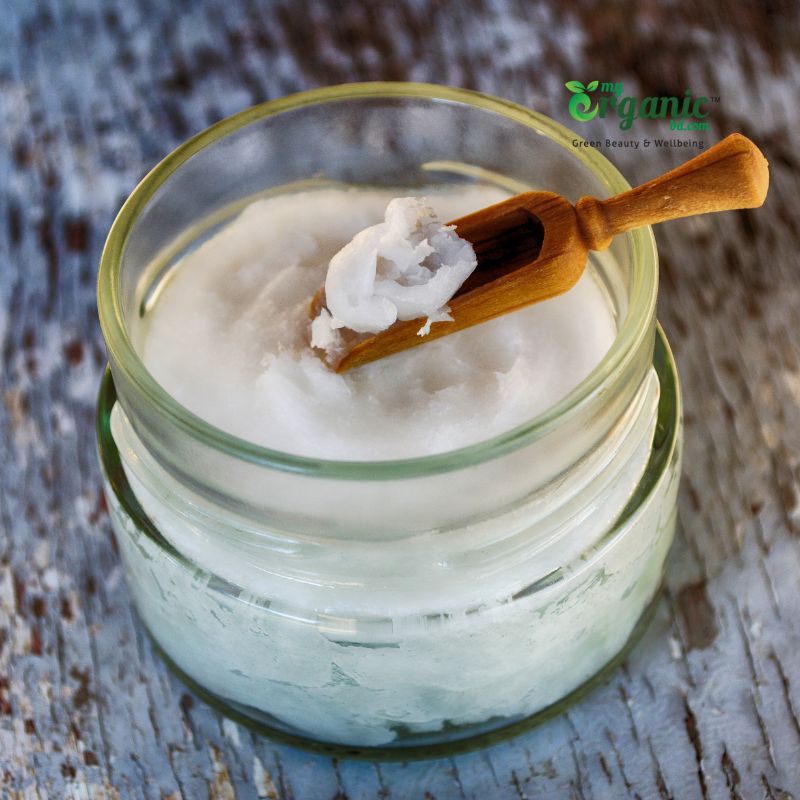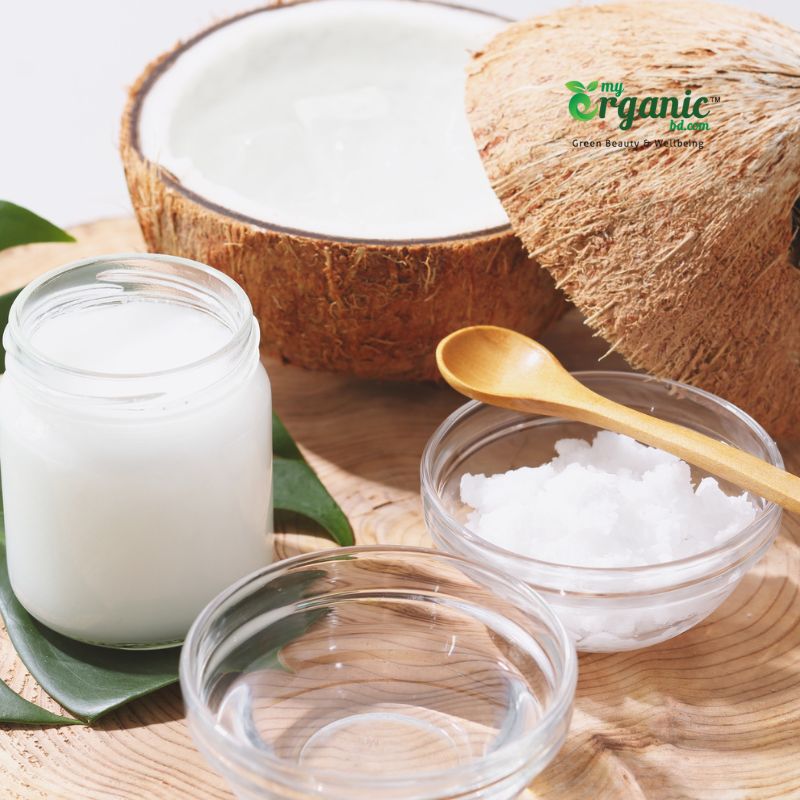Coconut oil is one of the oldest types of oil, dating back 4000 years. It is known for its versatility but not so much for its benefits. Although it offers a handful of amazing benefits for the wellness of our body.
But like most amazing things, coconut is not beyond controversy. Some of its controversies may also be true. The best you can do is learn inside out & use properly. And that’s why we are here.
We are Team My Organic BD. We are a team of wellness coaches, nutritionists, microbiologists, and writers working together for ten years in the organic wellness industry. With our cumulative experience and expertise, we can offer the best insight about natural coconut oil.
Previously, we discussed all the products of coconut, such as coconut water, coconut meat, milk, MCT oil, and more. In this article, we will dive deep into coconut oil and its amazing benefits, uses, and considerations. And of course, all the questions people ask frequently about this amazing oil.
Let’s start!
Is Coconut Oil a Superfood?
Coconut oil certainly has amazing benefits. But it does not fulfill our criteria for a superfood. Why? If you read our superfood content, superfoods must have a special ability for good health. Some food can also be called a super food depending on nutrient diversity and rare nutrients. Most of the benefits are not as food but as a skin or hair care product. But the main problem is its controversy. Any food that has the potential for a negative impact can not be called a superfood. Previously, coconut oil was known as healthy for heart health. However, some recent studies suggest, it contains bad cholesterol and might not good for heart health. The conflicting results of different studies make it hard to draw a reliable conclusion. We will dive deep into those in a while.
However, if you want, you can call it a super oil for skin and hair care. The Secrets will be revealed in the next part of the article.

Coconut oil and virgin coconut oil
These two may sound similar, but they are quite different in many ways. They are made with different production methods, which alter their composition and benefits a bit. But at the core, they are the same products. Let us explain.
Regular coconut oil is refined, heated, and produced in regular way. Virgin coconut oil is made with a cold press, which extracts the oil without any heat or processing.
Due to heating, regular coconut oil may have some trans fat. White virgin coconut oil has medium-chain triglycerides (MCT) and a very small amount of trans fat.
This virgin oil reserves some of the coconut milk’s flavor and goodness. It also has more antioxidants and a natural antibacterial effect. It may also help the thyroid gland function.
Regular coconut oil is less beneficial for eating and skincare. In general, we suggest getting virgin coconut oil whenever you can.
History of Coconut Oil
Historians suggest coconut oil appeared first about 2000 BC, or about 4000 years ago. After the domestication of the coconut, people observed its benefits and versatility for daily life and wellness. This oil has always been an important product for tropical cultures. It originated in Southeast Asia, especially in the Philippines, Indonesia, and nearby places. In the region, the coconut is known as the tree of life, as their life depends on the coconut in many ways. They used it for cooking, skincare, fuel, etc. As the coconut tree spread all over the world, almost all cultures learned about its amazing potential & oil. Finding out ways to make oil from coconut was not hard at all. Coconut meat is 60% fat. When trade started, coconut oil was one of the main items that was traded with the people of India, Africa, and the Middle East. Coconut became popular in Europe in relatively recent times. In the 19th century, this oil increased in the region for the production of soap and skin care products. Today, many parts of the world use coconut oil for skincare, but still, it is used more for making industrial skincare products. In a large part of India and South East Asia, coconut oil is the main oil for daily cooking.

Nutritional Facts
Coconut oil contains 100% fat content. In 100 grams of oil, there is 100g of fat, with a very trace amount of vitamins and other minerals. Due to its high-fat content, it contains high energy, about 864 calories per 100g.
This oil does not contain any fiber, protein, or carbohydrate. It generally does not contain notable amounts of vitamins or minerals. It is important to understand the type of fat in coconut oil. About 80-90% of coconut’s fat is saturated fat. 65% of coconut oil is MCT fat, which have fat-burning effect. But the fat-burning ability of this oil is also controversial. If we break down the type of fat in this oil, we will get lauric (47%), myristic, and palmitic acids. Studies show these can increase harmful LDL in our bodies. (more discussion in the latter part)
What are the Benefits of Coconut Oil?
Let’s focus on the brighter side of coconut oil, and certainly, there are not a few.
Fat-burning ability
As mentioned, coconut oil contains a high amount of MCT. There are long, medium, and short-chain triglycerides. Long-chain fats require more time to be absorbed by the body. They are more prone to be stored in the body. while medium-chain fat is absorbed faster and used directly for energy. It may play a role in burning body fat when combined with ketogenic diets.
However, coconut oil also contains lauric acid, which burns like LCT and may cause fat gain. Therefore, this oil may not be ideal if you are looking to burn fat. Note that there is a lack of research in this sector. More research is required to draw a dependable conclusion.
Antimicrobial Property
The lauric acid of coconut oil has the ability to fight bacteria. Studies suggest this oil can prevent bacteria from multiplying without killing them. The oil works nicely to fight common bacteria like Escherichia coli, Helicobacter pylori, Staphylococcus aureus, Streptococcus mutans, & candida spp.
Fast Energy Source
As described, the LCT of coconut oil takes a short time to break down and provide energy. Unlike carbohydrates, a small amount of this oil can provide a lot of energy in a short time. It can be useful for athletes, trackers, or workouts.
Reduce Hunger
The oil reduces feeling of craving and hunger. MCT breaks down into ketones and stops the brain from sending hunger signals. This ability of coconut oil can be used for reducing weight and burning fat. Also keep in mind that this oil contains a lot of calories. If you not take consciously can give the opposite result of weight loss!
May Prevent Liver Disease
A 2017 study on rats shows that coconut oil may have the potential to protect the liver from disease. Researchers fed this oil for four weeks in one group of rats and observed them. They had better liver conditions compared to other rats.
Skin Health
This super oil is way more reliable for skin care. It is a natural moisturizer with a lot of benefits. It deeply moisturizes the skin and prevents water loss and overall function. Using coconut oil regularly can improve the complexion of the skin. It works as a layer of protection against harmful bacteria, sunlight, and chemicals.
Hair Care
This super oil is well known for its hair-friendly nature. It gets deep into the roots of hair and improves hair strength. Coconut oil’s antibacterial nature also prevents the dandruff problem.
Dental Care
The lauric acid of this oil helps prevent the growth of bacteria in our mouth. Research shows it can be more effective in preventing S. mutans than other mouthwashes. It also prevents plaque formation for longer and helps soothe the gum inflammation. Coconut oil can be an organic way to take care of dental health.
Issues with Coconut Oil
Coconut oil has medium chain triglycerides (MCTs) that quickly digest. It produce energy instead of stored as fat. This oil can increase HDL ( the good cholesterol), it also increase LDL ( the bad cholesterol) according to research. because of this dual effect, maximum health professional do not consider it heart-healthy oil.
The lauric acid of this oil directly linked with higher cholesterol level. This oil may not be the best choice for daily use if your wellness goal is heart health. However, using this natural oil with limited amount considered safe. As always, it is best to consult your dietician for a balanced diet.
What are the uses of Coconut Oil?
Coconut oil is primarily used for skin care and hair care. It is a key component of many cosmetic items. This amazing oil does a great job fighting different skin problems. It cures dry skin and improves functionality. It is good for the lips and dark circles around the eyes. The anti-bacterial property of this oil makes it a good choice for acne and rash. It is often used as an organic makeup remover.
This super oil poses excellent benefits for hair nourishment. It is used for hair massage, moisturizer, and shampoo. It strengthens the hair from the scalp. It also fights against dandruff and infection. If you are looking for a soothing organic mouthwash, coconut oil is your solution.
Coconut oil is widely used for cooking in different areas like South India, Indonesia, Philippines, etc. According to some research, those people have a lower rate of heart disease than the world! Although the claim is arguable that we explained earlier. There can be other reasons. This oil can also used as a vegan substitute for butter. It enhances the flavor of sweet dishes. Adding a small amount of this oil to a smoothie can improve the taste and energy content. It is also used to make soap, candles, and metal polish. Run out of shaving cream? Use this oil as it can ensure protection from infection and cuts!
What is the taste of Coconut Oil?
Coconut oil has a nutty and sweet aroma with a hint of coconut. It tastes like other oil with its distinctive flavor. The smell combines nicely with many dishes. Extra virgin and regular coconut oil may have differences in taste. Depending on the production method, virgin coconut oil comes with a richer and more coconut-like flavor. Regular coconut oil has a less coconut-like aroma.

What is the impact of this natural Oil in the Wellness Industry?
Coconut oil is already popular for its different utilities. But in the wellness industry, this oil is not likely to take a place. There need more concrete research. The effects of this oil on heart health are not fully clear yet. If more advanced studies show that this oil is free from its potential risks, there is a good chance to be an integral part of the wellness industry.
However, MCT oil is a product derived from coconut oil. It is more reliable in compared to fat-burning and heart health. It is more likely that this oil will remain more popular for hair and skin care, while MCT oil will be more popular for wellness. Check out our detailed article – Science-Backed natural MCT Oil Benefits, Dosages and Side Effects.
Future of Coconut in Human Civilization
Coconut has always been with human civilization. A significant number of people are dependent on the cultivation and production of coconut and coconut products. In this era of environmental and population crisis, coconut has become more important than ever. It is one of the sustainable plants if planted in the right places, especially near the shore and rivers. The coconut tree is great protection from soil erosion and works as a wall in storms. More importantly, every part of the coconut tree is usable. The health benefits of coconut is great for our wellness. The products from the coconut can replace plastic. Coconut and coconut oil will remain a dependable friend to humanity.

Is Certified Organic Coconut Oil better?
Organic coconut oil is, of course, better than farmed ones. A coconut that grows naturally without any use of chemicals may be better for health. Rainforest Alliance Certification and USDA organic are some of the certifications you can look for coconut oil. But in general, it may not matter much, as a coconut does not require a lot of artificial care.
FAQ
Can I apply coconut oil to my face?
Of course, you can use coconut oil on your face for skin care and massage. It will hydrate and smoothen your skin from deep and improve skin complexion. It may work as a mild sunscreen in outside. But it’s not something you would like to use as a face moisturizer for going outside. This oil is too thick and oily for that.
Why is coconut oil called virgin?
Coconut oil that is cold-pressed and produced without heat is called virgin coconut oil. They may be richer in flavor and taste than other coconut oils. Not all coconut oil is virgin.
Does coconut oil brighten the skin?
Coconut oil does not have direct benefits for skin brightening. But it can protect the skin from sunburn and potential darkening. It also improves skin health by moisturizing deeply.
Is coconut oil good for lips?
Yes, coconut oil can be great for healing dry and lifeless lips.
Is Sri Lankan coconut oil good?
Yes, coconut is one of the main crops of Sri Lanka and its oil comes with good quality.
Does coconut oil expire?
Regular coconut oil has a shelf life of 2-3 years if stored properly in a cool and dry place. Virgin coconut oil can be stored even longer, about 5 years.
Conclusion
Coconut oil serves humanity with all its versatility and gentle nature. It may not be considered a superfood, but still, it is an essential item for wellness. We should focus on complete the remaining research on this amazing oil. This is how we will be able to use its maximum potential.
Did you ever hear about coconut flour? It’s pretty interesting. Read every question answered about coconut flour.
Mr. Shariful Alam Pavel believes in natural living. To live a healthy conscious living, we need to eat green, live green. MyOrganic Bd is a green wellbeing brand, educating millions to live a better life with mother nature.
- Shariful Alam
- Shariful Alam
- Shariful Alam
- Shariful Alam
- Shariful Alam
- Shariful Alam
- Shariful Alam
- Shariful Alam
- Shariful Alam
- Shariful Alam
- Shariful Alam
- Shariful Alam
- Shariful Alam
- Shariful Alam
- Shariful Alam
- Shariful Alam
- Shariful Alam
- Shariful Alam
- Shariful Alam
- Shariful Alam
- Shariful Alam
- Shariful Alam
- Shariful Alam
- Shariful Alam
- Shariful Alam
- Shariful Alam
- Shariful Alam
- Shariful Alam
- Shariful Alam
- Shariful Alam
- Shariful Alam
- Shariful Alam
- Shariful Alam
- Shariful Alam
- Shariful Alam
- Shariful Alam
- Shariful Alam
- Shariful Alam
- Shariful Alam
- Shariful Alam
- Shariful Alam
- Shariful Alam
- Shariful Alam
- Shariful Alam
- Shariful Alam
- Shariful Alam
- Shariful Alam
- Shariful Alam
- Shariful Alam
- Shariful Alam
- Shariful Alam
- Shariful Alam
- Shariful Alam
- Shariful Alam
- Shariful Alam
- Shariful Alam
- Shariful Alam
- Shariful Alam
- Shariful Alam
- Shariful Alam
- Shariful Alam
- Shariful Alam
- Shariful Alam
- Shariful Alam
- Shariful Alam
- Shariful Alam
- Shariful Alam
- Shariful Alam
- Shariful Alam
- Shariful Alam
Dr. Goutom Banik, MBBS, MPH, is a public health researcher with extensive experience in maternal, newborn, and child health, including nutrition interventions in underserved communities. He has worked with leading organizations such as Save the Children and icddrb, contributing to national strategies on child health and nutrition. His expertise spans operational research, health systems strengthening, and community-based programs addressing childhood illness.
- Dr Goutom
- Dr Goutom






